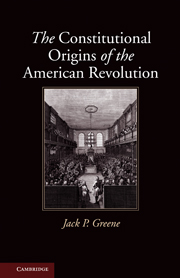Preface
Published online by Cambridge University Press: 05 June 2012
Summary
Preface
As the title announces, this is a book about the constitutional origins of the American Revolution as they were reflected in the unfolding debate over the distribution of authority within the British Empire during the late colonial era and the years of imperial crisis from 1764 to 1776. This subject has been of recurrent interest to me for almost sixty years. Through most of the 1950s and early 1960s, I was hard at work trying to sort out the institutional, constitutional, and theoretical dimensions of the development of representative government in four early modern British American colonies between the Glorious Revolution and the American Revolution. Among other things, I was endeavoring to understand the bearing of that development on the controversy that produced the American Revolution. Briefly put, the argument I developed about the Revolution had two main points. The first was that the new British taxation and coercive measures after 1748, some emanating from the Crown and some from Parliament, represented a formidable challenge both to the customary constitutions that the colonies, severally, had been working out for themselves over the previous century or longer and to the thoroughly English rights and principles that those constitutions had been constructed to preserve. The second was that colonial responses to that challenge, responses that drew heavily on the colonists’ own customary constitutions, articulated a conception of the imperial constitution that diverged sharply from the one held at the imperial center, and that this disagreement over the nature of the imperial constitution had an important causal bearing on the American Revolution.
When I finally began to publish this work in the late 1950s and early 1960s, few scholars of the origins of the Revolution paid much attention to this particular argument. Concerned principally with showing the many deficiencies of the Progressive interpretation of the Revolution as the product of internal conflict, a view that had enjoyed a brief vogue in the 1930s and 1940s, most students of the Revolution focused on analyzing the ostensible issues that divided metropolitans and colonials between 1763 and 1776 and manifested little concern with exploring the political and constitutional traditions or the patterns of assumptions that underlay and informed that division. When, in the late 1960s, Bernard Bailyn and others did begin to explore those traditions and assumptions in depth, they assigned little causative weight to the specifically constitutional dimensions of the conflict. In Bailyn’s ideological interpretation of the Revolution, neither the early modern English jurisprudential tradition of political writing nor the related liberal and Whig traditions that had been largely constructed on that jurisprudential tradition received much emphasis, especially not in comparison with the fears of corruption and ministerial power that, for Bailyn, principally informed colonial protests of the pre-Revolutionary era. The force of my protest that throughout the era before 1763 colonial legislators and polemicists had been infinitely more concerned about limiting prerogative than about preventing corruption was, it seemed to me, mostly lost on a historical community that was rushing to absorb and work out the implications of Bailyn’s ideological interpretation.
- Type
- Chapter
- Information
- The Constitutional Origins of the American Revolution , pp. ix - xxivPublisher: Cambridge University PressPrint publication year: 2010

